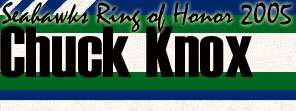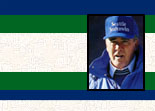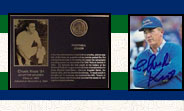

    |
|
Tribute: “I had the privilege and honor of meeting Coach Knox at Dave Krieg's induction ceremony.” Continue reading
Knoxisms: “Don’t ever again tell me how rough the waters are, just bring the ship in.” .
Statistics: Wins and losses throughout his career.
What We've Overheard: "He so deserves it. He was the one who put Seahawks football on the map."
Who He Is: Knox started donating Seahawk fine money to charity when he became coach in 1983
Just for Fun:
I hadn’t been in the football biz since the Brian Bosworth substitution caper of 1988, but that had been some of my best work...
Ring of Honor:
Thanks to all of you who answered the call to send postcards or email to the Seahawks requesting that Chuck Knox be inducted into the Seahawks Ring of Honor!
|
Chuck's Game Plan Source: Inside the Seahawks, Vol. 1, No. 4, August 29-Sept. 4th, 1986 Here is Chuck Knox's day-by-day schedule of preparations,for a game. Monday, our staff comes in, the first thing we do is look at the film of Sunday's game and grade the players. We get that all broken down. Then our football team comes in, usually at 12:30, and we look at the special teams reel. Then we meet and go over the film with the players. Then we go on the field, have some stretching, running, conditioning and some loosening up. And then we'll take and spend about 20 minutes going over some things that we need to go over. Tuesday morning we come in, most of our coaches are in at 6:30-7 o'clock in the morning. The players have Tuesday as a day off, with the exception of those players who need treatment, they come in. We'll work from 6:30-7 in the morning throughout the day, until about 10:30-11 o'clock at night. We'll be preparing the game plan. Offensively, defensively, special team-wise. We don't go out to lunch, we don't go out to dinner or anything like that. We have a little brown bag operation. Sometimes we have food brought in. We have a microwave here and the soups and that type of thing. Wednesday, we come in at the same time in the morning. The players come in at 9:30 and we meet and go on the field at 1 o'clock. We're off the field by a little after three. Wednesday is the day that we devote about two-thirds of the practice to defense, one-third to offense. Then the players will lift weights after practice, they'll stay around and look at some film, they'll take film home with them. Our staff will continue to work until 10:30-11 o'clock at night. We have got the basic plan in. We still have not put in the short yardage, the goal line, offense and defense. We still have not put in special packages for nickel defenses, special packages for nickel offenses versus nickel defenses. Still have not gone into situation offense: what we want to do if we're backed up, say, on our own 10-yard-line coming out. We still have not put in the inside-the-20 things. And that's why we need to continue to work that night. We do the same thing on Thursday, but Thursday's a practice that will be devoted two-thirds to offense, one-third to defense. Working on the kicking game both days. Friday, we have the same schedule. Friday is a general review offensively and defensively, splitting the practice 50-50. We will coverall the situations on Friday. The short yardage, the goal-line offense, defense, inside-the-20 offense and defense, and so on. The coaches will get to go home early on Friday, try to get home to have dinner with their families. Usually, they're out of there by 6-6:30. On Saturday, we come in Saturday morning and meet with the staff at 8, meet with the players at 9, go on the field and have a light workout at 10 o'clock. Lasts no longer than an hour. Then if we're travelling we go directly from the practice to the airport and fly out. If we're playing at home the players are free to go home and report to the hotel where we're staying that night at 8:30. We have a meeting, a hamburger buffet at 10, curfew and bed-check at 11. Same thing would be true on the road. Play the game on Sunday. If we're playing away, we leave immediately from the stadium, go directly to the airport, get on the plane and fly back.
A Kind and Decent Man
Source: Looking Back, July 21, 1990: Final curtain Brian Bosworth - who held so much promise and delivered so little for so much - will be remembered most for his haircut, blue reflector shades, and insipid Right Guard commercials. Not for tackles. Weep not for Bosworth flunking his physical with the Seahawks and returning to moviemaking. ... He must have made Coach Chuck Knox's gut churn. Still, Knox never badmouthed The Boz. At the final curtain, Knox wished him well. If Bosworth learned anything in Seattle, let it be that lesson in class.
Giving Back
Source: Sports: Thursday, December 19, 1991
Knox, 59, Still `Lean And Mean' by Craig Smith The recipients: Union Gospel Mission, $5,000; Coastal Community Action Program (Grays Harbor), $5,000; Seattle Times Fund for the Needy, $1,000; P-I Action Fund, $1,000; Journal-American Home Fund, $1,000; Salvation Army, $1,000; Northwest Harvest, $1,000; Fred Hutchinson Cancer Research Center, $1,000 and Odessa Brown Clinic, $1,000. Another $8,000 is expected to be distributed to other charities. Knox started donating Seahawk fine money to charity when he became coach in 1983, and the nine-year total will top $100,000 this year.
Source: Ex-Hawks coach pays school back with $1 million by
DAVE BOLING; THE NEWS TRIBUNE,
Last updated: January 27th, 2005 02:40 AM (PST) The stealth was required because his stern father disapproved, preferring that young Chuck make his living in the blast furnaces and open hearths like just about everybody else in the western Pennsylvania town of Sewickley. But Juniata offered Knox a chance to walk on to the football team. It offered an opportunity, and it offered an escape. And Knox capitalized. More than half a century later, Knox repaid Juniata of Huntingdon, Pa., with the endowment of $1 million to fund a chair in the history department. The former Seattle Seahawks coach, now living in La Quinta, Calif., said Wednesday he wanted to “give something back for the great experience I had there.” As Knox expanded on his motivation for the generous endowment, it reinforced the role of education in his own personal history, which seems, now, like a very real American success story. “My dad came from Ireland when he was 22, and my mother came from Scotland at 22,” Knox said. “They had two boys; my brother and I were first-generation (Americans). We had no relatives in this country at all. And both boys went on to graduate from college.” And Knox, of course, was named coach of the year four times with three franchises during 22 seasons as a head coach in the NFL. His education at Juniata, in many ways, was the career catalyst. “I had worked in the steel mills and made enough that I had some money in my pocket,” he said. “I wasn’t sure I wanted to go to college, and I started out slow. But after that first year, I decided I was going to take care of the academic end of it.” He majored in history and benefited from the influence of professor Ken Crosby. He graduated with distinction, and discovered cross-over application of the lessons in his new career as a coach. “The lessons of history always help you make decisions with regards to the present and the future,” Knox said. “I always believed that football coaching was teaching, and that the football field was an extension of the classroom. I always felt you had to have a practice planned just like you would want a lesson plan for the classroom if you wanted to be a good teacher.”
|
| HOME | EMAIL |